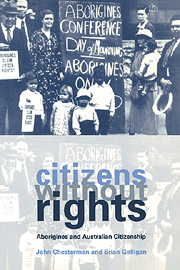Book contents
- Frontmatter
- Contents
- List of Tables
- Acknowledgments
- Abbreviations
- Dedication
- Introduction
- 1 The Citizenship Divide in Colonial Victoria
- 2 Under the Law: Aborigines and Islanders in Colonial Queensland
- 3 Is the Constitution to Blame?
- 4 The Commonwealth Defines the Australian Citizen (in association with Tom Clarke)
- 5 The States Confine the Aboriginal Non-citizen
- 6 The Slow Path to Civil Rights
- 7 From Civil to Indigenous Rights
- Notes
- Bibliography
- Index
2 - Under the Law: Aborigines and Islanders in Colonial Queensland
Published online by Cambridge University Press: 22 August 2009
- Frontmatter
- Contents
- List of Tables
- Acknowledgments
- Abbreviations
- Dedication
- Introduction
- 1 The Citizenship Divide in Colonial Victoria
- 2 Under the Law: Aborigines and Islanders in Colonial Queensland
- 3 Is the Constitution to Blame?
- 4 The Commonwealth Defines the Australian Citizen (in association with Tom Clarke)
- 5 The States Confine the Aboriginal Non-citizen
- 6 The Slow Path to Civil Rights
- 7 From Civil to Indigenous Rights
- Notes
- Bibliography
- Index
Summary
When we admit any person to citizenship along with us, we presume that he is fit to come into our company. What are the qualifications for citizenship of the aboriginals?
Senator Stewart, Queensland 1902 Commonwealth Parliamentary DebatesHaving investigated the position of Aboriginal Victorians in the years either side of federation, it is now appropriate to examine the policies of a colony and then State which had a relatively large Aboriginal population. Queensland was home to an estimated 100,000 Aborigines in 1788. By 1901 the official figure had fallen to 26,670, yet Queensland's Aboriginal population remained the largest of any State, and at federation was about 50 times the size of Victoria's.
Queensland has been the most recalcitrant State in conferring citizenship rights upon Aborigines. Restrictions on Aboriginal voters in Queensland elections remained in place until as recently as 1965, three years after the Commonwealth and West Australian governments removed similar restrictions. Earlier on, at the Commonwealth Constitutional Conventions and in debates on the fixing of the federal franchise, Queensland politicians were at the fore in ensuring that Aborigines were excluded from citizenship at both State and federal levels. Senator Stewart from Queensland made the remarks quoted above during the debates on the Commonwealth franchise bill.
- Type
- Chapter
- Information
- Citizens without RightsAborigines and Australian Citizenship, pp. 31 - 57Publisher: Cambridge University PressPrint publication year: 1997



